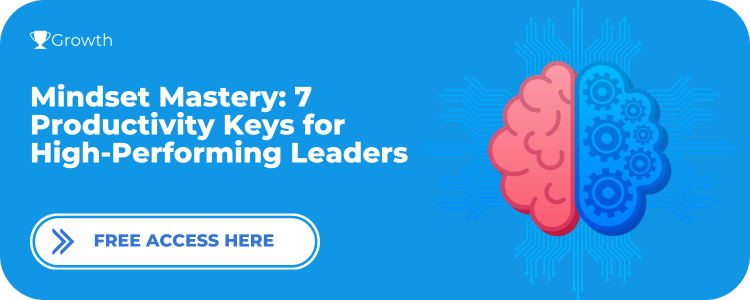✅ FREE ACCESS: Mindset Mastery: 7 Productivity Keys For High-Performing Leaders
What if I told you that procrastination could actually be good for you?
Sounds crazy, right?
But stick around, because today, we’re going to learn 5 science-backed tools that will change the way you look at procrastination and turn it into a secret productivity weapon.
But before we get into it, make sure you grant your lifetime access our free eBook:
Mindset Mastery: 7 Productivity Keys for High-Performing Leaders.
This is your chance to make the mindset shift you need to bring your goals into reality.
Let’s dive in.
Why do we procrastinate?
From an evolutionary perspective, our brains are wired for survival, not success.
Our ancestors faced an unpredictable and dangerous environment where resources were scarce.
It was crucial to conserve energy to increase their odds of survival.
The word “procrastination” comes from the Latin word “procrastinare,” which combines “pro” meaning “forward” and “crastinus” meaning “of tomorrow.”
Essentially, procrastination refers to the act of delaying or postponing tasks or actions.
Procrastination, in a way, acts as a mechanism to avoid unnecessary action until it’s absolutely necessary.
5 Reasons Why Procrastination is Good For You
Based on that evolutionary standpoint, we’re going to cover 5 reasons why procrastination can actually be beneficial for your productivity, personal growth, and success, and, most importantly, how to use that to your advantage.
Reason #1: Increasing Mental Clarity
Have you ever noticed how some of your best ideas come to you when you’re not actively working?
Procrastination can give your mind the break it needs to recharge and gain mental clarity.
Stepping away from your work allows your brain to process information in the background, leading to fresh insights and perspectives.
In other words, procrastination, when used strategically, can provide an opportunity for your brain to engage in a cognitive process known as incubation.
During this period of delay or procrastination, your mind continues to work on the task subconsciously, allowing for the exploration of various perspectives and potential solutions.
Several studies have explored the phenomenon of subconscious processing during procrastination.
A study conducted by Jihae Shin and Adam Grant at the University of Pennsylvania called “The Curvilinear Relationship Between Procrastination and Creativity”, used fMRI to examine brain activity during an intentional procrastination task.
The researchers found that while participants were procrastinating, their brains exhibited increased activation in regions associated with creative thinking, such as the default mode network.
Also, a study by Benjamin Baird called “Inspired by Distraction: Mind Wandering Facilitates Creative Incubation” found that individuals who engaged in a period of intentional procrastination before a creative task generated more creative ideas compared to those who did not procrastinate.
The researchers suggested that the incubation period during procrastination allowed for the unconscious processing of information, enabling novel connections and insights to emerge.
By giving your brain some time to subconsciously work on a task, you open up the possibility for fresh perspectives, novel approaches, and out-of-the-box solutions.
Finding the right balance will help you leverage the benefits of both focused effort and creative incubation.
The Pomodoro Technique
The Pomodoro Technique is a productivity technique based on sprints & breaks developed by Francesco Cirillo in the 1980s.
It has become one of the most successful frameworks for productive work based on break times since then.
I present the step by step process to implement the Pomodoro Technique and 6 mindset keys to help you develop an effective productive framework in the Mindset Mastery eBook provided in the description.
Reason #2: Enhancing Problem-Solving Skills
Delaying tackling a task or problem gives you more time to consider different approaches and potential solutions.
By allowing yourself some procrastination time, you give your brain the chance to make novel connections and come up with innovative solutions.
In his New York Times best-selling book, Originals: How Non-Conformists Move the World, Adam Grant explores the power of procrastination and its role in fostering creativity and innovation.
Grant explains that delaying action on a task allows individuals to engage in divergent thinking, which involves considering multiple possibilities and generating a wider range of ideas.
By giving yourself more time to mull over the task at hand, you can tap into your creative potential and discover innovative approaches.
Grant’s book highlights examples of successful individuals who have embraced strategic procrastination to their advantage.
One such example is Martin Luther King Jr., who famously composed his iconic “I Have a Dream” speech in the final hours leading up to the historic March on Washington.
King’s procrastination provided him with the mental space needed to formulate and refine his visionary message, resulting in a speech that continues to inspire generations.
So, by allowing yourself some procrastination time, you’re not simply wasting time or avoiding work.
Instead, you’re giving your brain the opportunity to engage in unconscious processing and creative thinking.
This can lead to the generation of novel connections, innovative solutions, and fresh perspectives that may not have emerged through immediate action.
Remember, effective time management and productivity still play crucial roles in achieving your goals.
Strategic procrastination should be used in moderation and combined with focused effort to strike the right balance between productivity and creativity.
So, don’t be too hard on yourself for procrastinating; instead, embrace it as a valuable problem-solving tool.
Reason #3: Sparking Motivation
Surprisingly, procrastination can actually spark motivation.
When faced with a looming deadline, the pressure and sense of urgency can awaken a surge of motivation within you.
The impending consequences of not completing the task on time can provide the necessary push to overcome inertia and take action.
To harness the motivational power of procrastination, it’s important to implement practical strategies, though.
This won’t happen automatically.
So, here’s a step-by-step process to effectively leverage this phenomenon and enhance your productivity:
Set Clear Deadlines:
Having a clear endpoint creates a sense of urgency and ensures that you allocate sufficient time for completion.
Break Down Tasks:
By dividing the work into more achievable portions, you can reduce the overwhelm and make progress step by step.
Prioritize Tasks:
Focus on the most critical and time-sensitive ones first, as the pressure of impending deadlines can enhance your motivation to tackle them.
Embrace Procrastination Mindfully:
Allow yourself a brief period of delay while maintaining awareness of the impending deadline.
Use this time to mentally prepare, gather necessary resources, or brainstorm ideas.
Create a Procrastination Buffer:
Allocate a buffer time before the deadline to account for unexpected challenges or revisions.
This buffer can help alleviate the stress and last-minute rush, allowing you to work more efficiently and produce higher-quality results.
Avoid Excessive Procrastination:
While strategic procrastination can be beneficial, excessive delay can lead to unnecessary stress and compromised outcomes.
Be mindful of striking a balance between utilizing procrastination as motivation and ensuring timely completion of tasks.
By following this step-by-step process, you can effectively leverage the motivational spark ignited by procrastination.
Just remember that each individual’s optimal approach may vary, so experiment with different techniques to find what works best for you.
Self-awareness and self-discipline are key.
Reason #4: Fostering Better Decision-Making
Believe it or not, procrastination can actually improve decision-making efficacy.
In the book Thinking, Fast and Slow, Daniel Kahneman introduces the concept of two thinking systems:
System 1, which is fast and intuitive, and System 2, which is slower and more deliberate.
When we procrastinate on a decision, we engage our System 2 thinking, allowing for a more thorough evaluation of the available information.
Kahneman emphasizes that taking the time to gather more data and carefully evaluate options can lead to better-informed decisions.
By procrastinating, we provide ourselves with an opportunity to engage in deeper analysis, weigh the pros and cons, and consider alternative perspectives.
This way, your choices will be based on a more comprehensive analysis, leading to better outcomes and increased chances of success.
Remember, the key is to balance procrastination with mindful action.
While procrastination can provide valuable benefits, excessive delay can hinder progress.
Use it as a tool for gathering information, evaluating options, and making thoughtful decisions.
In Mindset Mastery eBook provided in the description, I talk more about how to enhance your productivity naturally just by applying a sleep time technique.
Reason #5: Cultivating Self-Reflection
Procrastination can be a catalyst for self-reflection and personal growth.
When you’re not constantly occupied with work, you have the chance to reflect on your goals, priorities, and aspirations.
Use your procrastination time to evaluate your progress, identify areas for improvement, and set new objectives.
This self-reflection can be a powerful tool for achieving success and making meaningful changes in your life.
When you engage in self-reflection, you take a step back from the daily grind and create a space for introspection and evaluation.
You can use these moments to reflect on your goals and priorities.
You can assess whether our current actions align with our long-term vision and make adjustments if necessary.
Journaling is one practical example of incorporating self-reflection into your daily routine.
Here’s how to start journaling today:
Set aside a few minutes each day to write down your thoughts, feelings, and reflections.
Use this time to evaluate your progress, celebrate achievements, and identify areas for improvement.
Ask yourself questions like:
- What actions did I take today that brought me closer to my goals?
- Are there any patterns or habits that are hindering my progress?
- How can I better align my daily activities with my long-term objectives?
- What are my priorities for tomorrow, and how can I optimize my time to focus on them?
By consistently engaging in this reflective practice, you develop a habit of intentional self-assessment and progress monitoring.
It allows you to make conscious adjustments and take proactive steps towards your personal and professional growth.
Reasons Why Procrastination is Good For You: a pathway forward
And there you have it – 5 reasons why procrastination is good for you.
From boosting creativity and enhancing problem-solving skills to sparking motivation and fostering self-reflection, procrastination offers unexpected benefits for personal growth and success.




